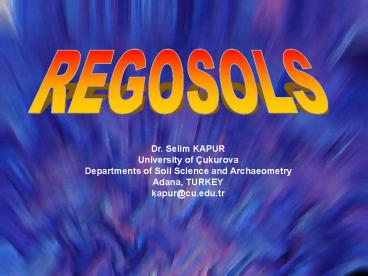REGOSOLS PowerPoint PPT Presentation
1 / 11
Title: REGOSOLS
1
REGOSOLS
Dr. Selim KAPUR University of Çukurova Departments
of Soil Science and Archaeometry Adana,
TURKEY kapur_at_cu.edu.tr
2
DESCRIPTION
- From greek rhegos blanket meaning YOUNG soils on
weathering materials - Weakly developed very shallow mineral soils.
- Unconsolidated materials
- AC profile, MINIMAL PROFILE DEVELOPMENT
- Rarely slight lime and/or gypsum accumulation
- Slow soil formation due to dry climate
- No diagnostic horizons other than an Ochric
- Extensive on eroded lands ie. in mountain regions
- Occurs at all climates but particularly common in
arid and semi-arid zones - Correlate with soil taxa marked by incipient soil
formation Entisols - Varying management, COMMON USE AS LOW VOLUME
GRAZING, BUT BEST FOR FORESTS
3
Common soil units
- Gelic
- Leptic
- Hyposalic
- Gleyic
- Thaptovitric
- Thaptoandic
- Arenic
- Aric
- Garbic
- Hyperochric
- Anthropic
- Aridic
- Reductic
- Spolic
- Urbic
- Tephric
- Gelistagnic
- Stagnic
- Humic
- Gypsiric
- Calcaric
- Takyric
- Yermic
4
No pedological evidence ie color, structure,
texture throughout the profile
Marine sediment
Alluvial material
http//www.ucalgary.ca
http//www.ucalgary.ca/
5
Arenic Regosol
6
Lacustrine/Wetland sediment
7
Soils of the western coast of Sorkappland
Gelic Dystric Regosol (Kulmstranda)
Geli-Hyperskeletic Regosol (Gasbreen - frontal
moraine)
Gelic Dystric Regosol - profile (Kulmstranda)
8
DISTRIBUTION
9
ASSOCIATIONS WITH OTHER SOIL GROUPS
Regosols are integrates with
- Cryosols in cold regions
- Andosols, Leptosols or Umbrisols in mountain
regions - Calcisols or Gypsisols in arid regions
- Arenosols and Podzols on sandy deposits
- Cambisols in semi-arid regions
10
CHARACTERESTICS
- The great variation among Regosols (taxonomic
rest group!) makes it virtually impossible to
give a generalised account of Regosol
characteristics. - The central concept of a Regosol is a deep,
well-drained, medium-textured, non-differentiated
mineral soil that has minimal expression of
diagnostic horizons (other than an ochric surface
horizon), properties or materials. - Parent material and climate dominate the
morphology of Regosols. The content of
weatherable minerals varies from low to extremely
high (little transformation). - In cool climates, the surface horizon contains
poorly decomposed organic matter whereas (ochric)
surface horizons tend to be thin, low in organic
matter and generally weakly expressed in hot, dry
climates. - Regosols in dry regions have generally a higher
base status than Regosols in more humid
(mountain) regions. - Low coherence of the matrix material makes most
Regosols in sloping areas prone to erosion. - Low water holding capacity and high permeability
to water make most Regosols sensitive to drought.
- Many Regosols in colluvial material are prone to
slaking in particular those in löss. This makes
them sensitive to erosion in wet periods. Many
Regosols form a hard surface crust early in the
dry season the crust hinders emergence of
seedlings and infiltration of rain and irrigation
water in the dry season.
11
MANAGEMENT AND LANDUSE
- Many Regosols are used for extensive grazing
- Some on colluvial deposits on loess in N. Europe
are used for small grains, sugar beet or fruit
trees - In mountain regions best left to forests
- In steppe regions with 500-1000 mm ppt needs
irrigation with frequent application of water,
Sprinkler or trickle suitable for this low water
holding capacity but not economical - So better practice DRY FARMING which may be
better than installation of costly irrigation
facilities

